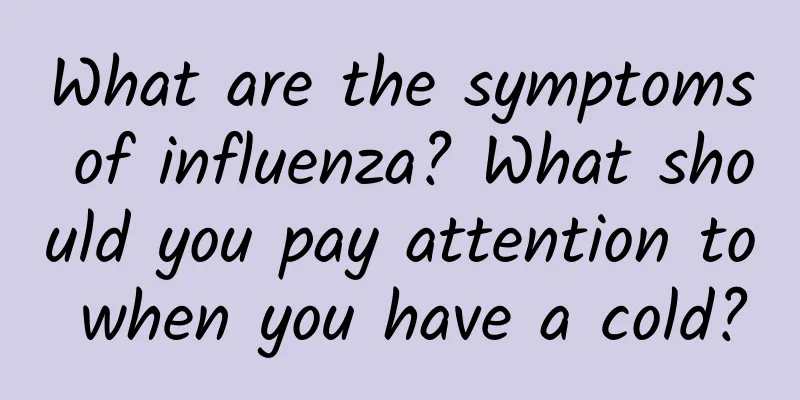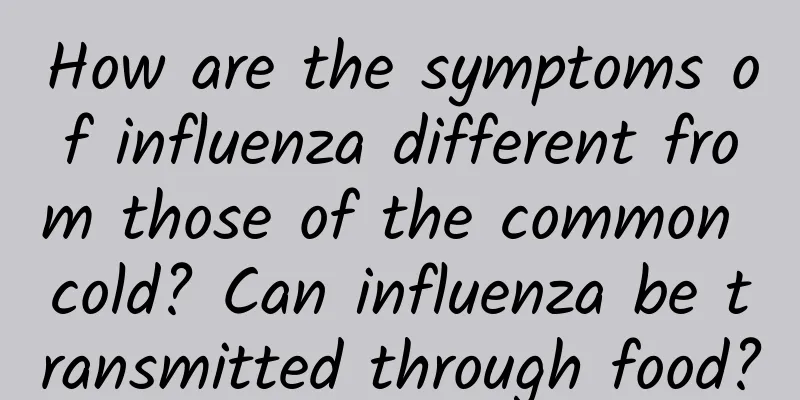What are the symptoms of influenza? What should you pay attention to when you have a cold?

|
If we have a cold, it is recommended that we eat more fresh vegetables and fruits to increase the body's vitamins and plant fiber, which is beneficial to the body's disease resistance. We should eat foods that are easy to digest and absorb. If it is the flu, what are the symptoms of the flu? Let's continue reading! Contents of this article 1. What are the symptoms of influenza? 2. What should you pay attention to when you have a cold? 3. Can I eat hot pot when I have a cold? 1What are the symptoms of influenza?The difference between the common cold and human flu Human influenza and the common cold are both acute respiratory infectious diseases, both are prone to occur in winter, and both have varying degrees of fever and respiratory symptoms. Of course, human influenza and the common cold are different. Human influenza is caused by human influenza virus. It mainly occurs in winter and spring. It has an acute onset, spreads quickly, has a high incidence rate, and can reach 50% of the infection rate, often causing outbreaks or epidemics. It is mainly characterized by systemic poisoning symptoms, chills and high fever, accompanied by general discomfort, muscle aches, joint pains, and mild or no obvious respiratory symptoms. Human influenza recovers slowly and is prone to complications, especially in children, the elderly and the weak, who may die from complications. Common cold - caused by a variety of viruses such as rhinovirus, coronavirus, adenovirus, etc. It can occur in all seasons. The rate is only 10%. The symptoms of systemic poisoning are mild, with low fever, but obvious respiratory symptoms, often starting with dry nasopharynx and sneezing, followed by runny nose and nasal congestion. A person can suffer from the common cold repeatedly in a short period of time. Common colds without complications. 2What should you pay attention to when you have a cold?1. If you have a cold, you must drink more water. The total amount of liquid intake per day should be between 2500 and 5000 ml. It helps to reduce fever, induce sweating, and eliminate toxins. Drink more water. 2. Eat more vegetables and fruits rich in vitamins. When you have a cold, you may have symptoms of gastrointestinal dysfunction such as abdominal distension, poor appetite, diarrhea, and constipation, so your diet should be plain and light. For side dishes, you should choose light foods such as various pickles, tofu, and meat floss. 3. When you have a cold, you should avoid eating raw, cold, greasy, fried, sticky, salty, spicy, hard and seafood food. During the cold period, avoid eating or eat too much duck, pork, mutton, dog meat, turtle, mussel, vinegar, persimmon and other foods. 4. Although you should not be exposed to the wind when you have a cold or fever, you should not close the doors and windows tightly, otherwise the indoor air will not circulate, which will cause the cold germs to multiply. Remember to wash your hands frequently and avoid crowded places to prevent cross infection. 3Can I eat hotpot when I have a cold?During a cold, it is not recommended to eat hot pot, overly greasy food, spicy food, or food that easily causes internal heat. During a cold, the diet should be light, with fresh vegetables and fruits, and plenty of water. Eating more fresh vegetables and fruits can increase the body's vitamins and plant fiber, which is beneficial to the body's disease resistance. Eat foods that are easy to digest and absorb. For colds, corresponding symptomatic treatment should be carried out. If there is obvious nasal congestion and runny nose, some drugs can be selected to reduce nasal mucosal congestion. If there are symptoms such as body aches and fever, some antipyretic and analgesic drugs can be appropriately selected. Symptomatic treatment can achieve better results. |
<<: A collection of frequently asked questions about refractive error in children
>>: Fear at every step – What is acute anxiety disorder?
Recommend
Why do women suffer from weak knees?
The knee is one of the most important joints in t...
Newborns are "miraculously" born with antibodies against the new coronavirus. Which viruses can be transmitted from mother to child?
A pregnant woman in Singapore gave birth to a chi...
How to treat uterine prolapse in the elderly?
Uterine prolapse in the elderly is uterine prolap...
What is the best medicine for women's tinnitus?
Tinnitus is one of the more common diseases in da...
Symptoms of uterine prolapse
In our lives, many women have some gynecological ...
Pregnant women, please note! There are six kinds of accidents that should prevent cardiovascular disease | American Heart Association
On March 29, the American Heart Association (AHA)...
Treatment for chest tightness during the fourth month of pregnancy
When you are three or four months pregnant, vario...
There is a hard lump on the vagina and it hurts. What's going on?
The health of the private parts is extremely impo...
Can I eat leeks during menstruation?
Leek is a very common vegetable. In traditional C...
Nipple color in adolescent girls
The color of a woman's nipples is different a...
What is the reason for the itching and white stuff down there?
A woman's vagina needs to be protected at ord...
Does Baofukang suppository treat HPV?
After contracting the HPV virus, some patients wa...
Do a pre-pregnancy checkup
In order to achieve the goal of eugenics, many co...









